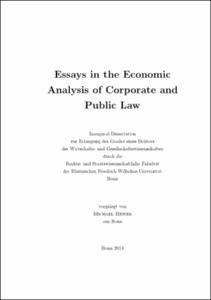Hewer, Michael: Essays in the Economic Analysis of Corporate and Public Law. - Bonn, 2013. - Dissertation, Rheinische Friedrich-Wilhelms-Universität Bonn.
Online-Ausgabe in bonndoc: https://nbn-resolving.org/urn:nbn:de:hbz:5-32459
Online-Ausgabe in bonndoc: https://nbn-resolving.org/urn:nbn:de:hbz:5-32459
@phdthesis{handle:20.500.11811/5433,
urn: https://nbn-resolving.org/urn:nbn:de:hbz:5-32459,
author = {{Michael Hewer}},
title = {Essays in the Economic Analysis of Corporate and Public Law},
school = {Rheinische Friedrich-Wilhelms-Universität Bonn},
year = 2013,
month = jun,
note = {This thesis contains three chapters:
The first chapter deals with bankruptcy and corporate laws that according to which insider loans to corporations are subordinated in bankruptcy. While moral-hazard related approaches have only found ambiguous results, this chapter focuses on asymmetric information. The finding is that informational asymmetries can justify the requalification: The more priority is given to the uninformed creditor, the better are the results from a welfare perspective.
The second chapter deals with compensations for takings. It adds to the literature (e.g., Blume, Rubinfeld, and Shapiro (1984), Hermalin (1995)) that not only the owner, but also the government may invest prior to the taking. When the government acts non-benevolently, i.e., neglect the interest of the owner, optimal compensation amounts to the hypothetical value of the landowner's property had she invested efficiently. In contrast, under a welfare maximizing government, the only regime to induce the first best grants as compensation the social benefit of the taking. Consequently, if government is budget constrained or if taxes imply an excess burden, welfare may be higher if the government acts non-benevolently.
In the third chapter a buyer wants to buy several perfectly complementary goods from several sellers under complete information. Agreements between the buyer and the sellers are possible only in a non-contingent way. In contrast to other papers in this are (e.g., Cai (2000)), the chapter assumes that the buyer's stand-alone valuation for a given parcel may be lower than the sellers'. With this assumption, the chapter is able to show that in a large class of bargaining games a complete breakdown of negotiations can occur as the unique equilibrium outcome.},
url = {https://hdl.handle.net/20.500.11811/5433}
}
urn: https://nbn-resolving.org/urn:nbn:de:hbz:5-32459,
author = {{Michael Hewer}},
title = {Essays in the Economic Analysis of Corporate and Public Law},
school = {Rheinische Friedrich-Wilhelms-Universität Bonn},
year = 2013,
month = jun,
note = {This thesis contains three chapters:
The first chapter deals with bankruptcy and corporate laws that according to which insider loans to corporations are subordinated in bankruptcy. While moral-hazard related approaches have only found ambiguous results, this chapter focuses on asymmetric information. The finding is that informational asymmetries can justify the requalification: The more priority is given to the uninformed creditor, the better are the results from a welfare perspective.
The second chapter deals with compensations for takings. It adds to the literature (e.g., Blume, Rubinfeld, and Shapiro (1984), Hermalin (1995)) that not only the owner, but also the government may invest prior to the taking. When the government acts non-benevolently, i.e., neglect the interest of the owner, optimal compensation amounts to the hypothetical value of the landowner's property had she invested efficiently. In contrast, under a welfare maximizing government, the only regime to induce the first best grants as compensation the social benefit of the taking. Consequently, if government is budget constrained or if taxes imply an excess burden, welfare may be higher if the government acts non-benevolently.
In the third chapter a buyer wants to buy several perfectly complementary goods from several sellers under complete information. Agreements between the buyer and the sellers are possible only in a non-contingent way. In contrast to other papers in this are (e.g., Cai (2000)), the chapter assumes that the buyer's stand-alone valuation for a given parcel may be lower than the sellers'. With this assumption, the chapter is able to show that in a large class of bargaining games a complete breakdown of negotiations can occur as the unique equilibrium outcome.},
url = {https://hdl.handle.net/20.500.11811/5433}
}






